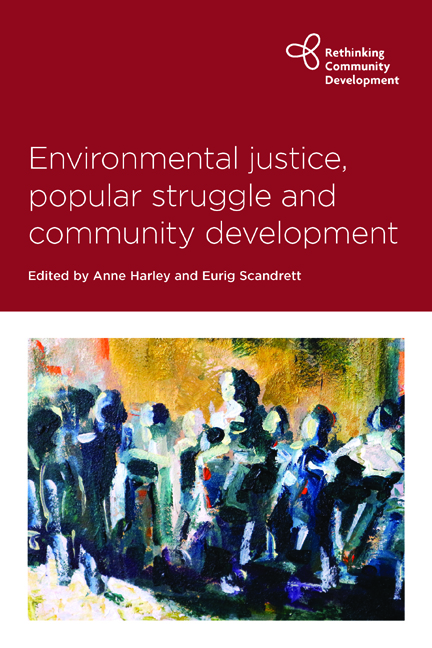Book contents
- Frontmatter
- Dedication
- Contents
- List of figures
- Series editors’ preface: Rethinking Community Development
- Preface
- Acknowledgements
- Notes on contributors
- Abbreviations
- One Community, development and popular struggles for environmental justice
- Two Resisting Shell in Ireland: making and remaking alliances between communities, movements and activists
- Three ‘No tenemos armas pero tenemos dignidad’: learning from the civic strike in Buenaventura, Colombia
- Four No pollution and no Roma in my backyard: class and race in framing local activism in Laborov, eastern Slovakia
- Five Tackling waste in Scotland: incineration, business and politics vs community activism
- Six An unfractured line: an academic tale of self-reflective social movement learning in the Nova Scotia anti-fracking movement
- Seven ‘Mines come to bring poverty’: extractive industry in the life of the people in KwaZulu-Natal, South Africa
- Eight Ecological justice for Palestine
- Nine Learning and teaching: reflections on an environmental justice school for activists in South Africa
- Ten The environment as a site of struggle against settler-colonisation in Palestine
- Eleven Communities resisting environmental injustice in India: philanthrocapitalism and incorporation of people’s movements
- Twelve Grassroots struggles to protect occupational and environmental health
- Conclusion
- Index
Ten - The environment as a site of struggle against settler-colonisation in Palestine
Published online by Cambridge University Press: 27 April 2022
- Frontmatter
- Dedication
- Contents
- List of figures
- Series editors’ preface: Rethinking Community Development
- Preface
- Acknowledgements
- Notes on contributors
- Abbreviations
- One Community, development and popular struggles for environmental justice
- Two Resisting Shell in Ireland: making and remaking alliances between communities, movements and activists
- Three ‘No tenemos armas pero tenemos dignidad’: learning from the civic strike in Buenaventura, Colombia
- Four No pollution and no Roma in my backyard: class and race in framing local activism in Laborov, eastern Slovakia
- Five Tackling waste in Scotland: incineration, business and politics vs community activism
- Six An unfractured line: an academic tale of self-reflective social movement learning in the Nova Scotia anti-fracking movement
- Seven ‘Mines come to bring poverty’: extractive industry in the life of the people in KwaZulu-Natal, South Africa
- Eight Ecological justice for Palestine
- Nine Learning and teaching: reflections on an environmental justice school for activists in South Africa
- Ten The environment as a site of struggle against settler-colonisation in Palestine
- Eleven Communities resisting environmental injustice in India: philanthrocapitalism and incorporation of people’s movements
- Twelve Grassroots struggles to protect occupational and environmental health
- Conclusion
- Index
Summary
Introduction
The Zionist settler-colonisation of Palestine is primarily an ecological distribution conflict (Martínez-Alier, 2002) because it is focused entirely on dispossession of land, water and other environmental resources. The state of Israel since 1948, and its military occupation of the West Bank and Gaza Strip since 1967, as well as precursor Zionist colonisation under British mandatory and Ottoman empirical rule, have been predicated on dispossession of Palestinian resources. Unlike classical colonisation, which exploits indigenous labour for the purpose of capital accumulation in the colonising state, settlercolonialism has no long-term interest in indigenous labour. On the contrary, the settler-colonial process actively expels or exterminates indigenous people in the process of resource dispossession (Veracini, 2010). Palestinian resistance to settler-colonisation should therefore be understood as a struggle for environmental justice.
In classical colonialism, value is extracted from the resources and labour of the colonised lands for the benefit of a colonising (usually European) country (Veracini, 2010). In such contexts, community development has often been used to integrate indigenous peoples into social, economic and political structures that serve the interests of the colonial power. By contrast, the purpose of settler-colonisation is access to land and resources by a settler population expelled from their origins, usually in Europe. The settler-colonist therefore seeks to remove and replace the indigenous population and has therefore largely not employed community development strategies. Britain, which had used community development strategies extensively elsewhere through its Colonial Office, did not do so during its Mandate of Palestine, where the policy objective was explicitly to facilitate Zionist settler aspirations rather than Palestinian economic, political or labour integration.
Palestinian popular resistance to settler-colonialism has taken a range of forms, from scholarship and legal challenge, through noncooperation and non-violent confrontation to armed struggle and the occasional targeting of civilians In the current context of an Israeli settler state, Israel's occupation of the West Bank, annexation of East Jerusalem and military blockade of the Gaza Strip, Palestinian community development has been employed in ways that both resist and collude with Zionist settler-colonisation. The distinction between collusion and resistance is a central tension, in response to environmental justice struggles against the settler-colonisation of Palestine.
- Type
- Chapter
- Information
- Publisher: Bristol University PressPrint publication year: 2019



